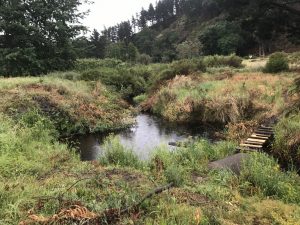Jakkals River Maintenance & Management Plan
The Groenlandberg Conservancy, established in 1994 by a handful of farmers, under the chairmanship of Dr Paul Cluver has been making an ever-increasing contribution to conservation on private and state-owned land over the past two decades. There are currently 39 active and passionate members that are committed to environmental conservation, sustainability and social uplifting.
The Conservancy has a very dedicated committee, who gets together regularly. The committee members are Stephen Rabe (chairman), Dr. Paul Cluver, Mike du Toit, Nancy Muzlai, Tony Davenport, Sebastian Beaumont, Neville van Buuren with CapeNature and DEA representatives also attending committee meetings. The Conservancy employs a part-time administrator and project manager, Anne Visser.
The Conservancy has been fortunate in partnering with key organisations like the Table Mountain Fund (TMF), who has been fundamental in making many of their conservation projects possible.
A 24-month alien clearing project along the Jakkals River was successfully completed in 2017, with generous funding received from TMF. Landowners have committed to keep the designated areas clear from all alien vegetation, after initial clearing took place, to ensure long-term conservation of the areas. Ongoing maintenance has been planned along the Jakkals River and its catchment.
The important role of the Jakkals River in the Elgin and Bot River catchment and cleansing areas has been heightened as a direct result of the integrated alien vegetation clearing program.
In 2018 the need was thus identified to develop a Maintenance and Management Plan for the Jakkals river. The Conservancy, with help from river consultants, submitted a proposal to TMF requesting funding to initiate a second phase looking at “Integrated rehabilitation of the Jakkals River ecosystem”.

The Conservancy was successful with this proposal and received further funding from TMF to engage with a river specialist and assess measures that can be implemented to rehabilitate the functionality of the river system.
The river system is currently threatened by large flood flows that results in an eroded river. Cleared lands and river banks are vulnerable to flooding and further channeling of the river. The river floods appear to be more destructive every year, resulting in major environmental, agricultural and infrastructural damage.
After extensive research, landowner engagements and site visits, a Maintenance and Management Plan was prepared by Dr. Liz Day, an independent freshwater consultant, as the mechanism for managing and achieving the project objectives. The plan has been submitted to DEADP and the Conservancy is eagerly awaiting approval.
The primary objectives of the project are to to rehabilitate forests, cleared lands and river banks with indigenous plantings, to design and agree on a River Management Plan, and to ultimately restore a healthy shape to the Jakkals River.